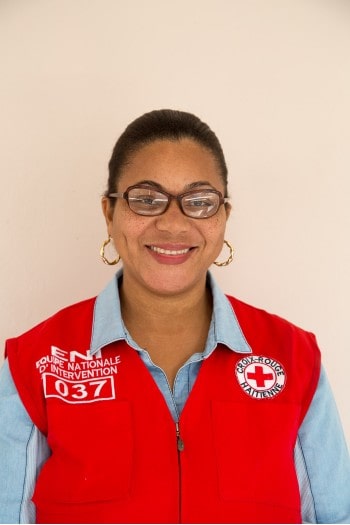On a sweltering day in late February volunteers from the Haitian Red Cross are trying their best to focus on Dr. Sherley Bernard despite the heat. Her energetic demeanour and the bare grey concrete walls help, but it’s the subject matter that captures their attention. The task at hand, among other things, learn how to respond to the COVID-19 outbreak — recently declared a pandemic by the World Health Organization.

Haiti is no stranger to dealing with infectious disease, having experienced numerous outbreaks in the past decade such as cholera and Zika. Still, control and quarantine capacity remain an ongoing challenge, increasing the risk that COVID-19 will spread across the country. Haiti also has the highest incidence of tuberculosis in the Americas and high rates of other chronic health problems such as HIV/AIDS, diabetes and hypertension, making early containment vital.
Back in the Port-au-Prince training room, the volunteers know that there’s a looming threat but it’s hard to truly grasp the significance of what’s going on. It would be 30 more days until the first confirmed cases of COVID-19 are announced in Haiti.
“We were almost preparing the country for COVID before the pandemic,” Bernard, Health Advisor for the Haitian Red Cross, said. “We did first aid trainings for more than 100 volunteers as well as training of trainers. We also did training on epidemic control and sessions with the community leaders as well as organizations in the community on how to prepare for a pandemic.”
Bernard joined the Haitian Red Cross as a volunteer in 2001 when she was still in medical school. Now armed with a master’s degree in public health and almost two decades of experience, she knows that training is just the first step.
“When COVID-19 happened, we were preparing and now we have to act,” she added. “But it was still a challenge for us turning the theory into practice.”
It’s easy to see this preparation as a fortunate confluence of events, but it’s not. It arose deliberately out of a desire, following the devastating earthquake in 2010, to ensure that the country is more prepared to respond when an emergency happens. Since that disaster the Canadian Red Cross, through the Urgences-Santé or Emergency Health project, has been helping to strengthen the capacity of local Haitian Red Cross staff and volunteers. Bernard believes this is making a difference.
“I think the capacity-building project helped. The Canadian Red Cross delegation was one of the first to intervene because we were already there working on this project,” Bernard said. “Because we already had these volunteers trained on epidemic control, we could quickly mobilize them. All they needed was a briefing on COVID-19 and we could get them out into the community working.”
She would know. In addition to her regular duties, she’s also serving as Program Coordinator for the project. It’s a promising start but a pandemic is a marathon, not a sprint. As the pandemic lingers, the team must adapt to emerging needs.
“Now we’re more focused on prevention,” Bernard explained. “The schools are reopening, so we’re focused on working with the most vulnerable schools to train teachers and raise awareness in the schools. We’re also organizing the training of trainers for psychological first aid so that we can train volunteers to intervene when mental health issues arise during COVID-19 and to prevent gender-based violence.”
These efforts have not gone unnoticed. Bernard’s unswerving leadership has earned the respect of the government and other organizations involved the country’s response to COVID-19, leading to a more coordinated approach. However, she still offers a cautionary refrain, that while progress has been made, the threat is far from over.
“People have started to be less cautious because they see cases decreasing. But, because there’s little access to screening or testing in many communities it’s difficult to stay how many people are affected by COVID-19,” Bernard warned. “People think the problem is solved and that there’s no more COVID-19 in the country. That’s why we need to put more focus on the awareness-raising to remind people that it’s not over yet.”
It’s local volunteers, like the those in Bernard’s training session, who are doing this work. That’s important because during a pandemic gaining the public’s trust is essential. Trust doesn’t come overnight. It’s built over time and forged by working respectfully in partnership with communities to meet their needs. It’s about having a presence in these communities before and after an emergency happens. It’s about showing up. About a month ago, when Bernard was visiting a Port-au-Prince suburb to facilitate more COVID-19 training, she witnessed this first-hand.

“I was with the driver in a Red Cross car and some people came up to us and gave us water,” Bernard shared. “I was about to pay for it, and they said, ‘No, this is for you because only the Red Cross comes here to help us in this community.’
Bernard cherishes these rare moments which make the importance of her work more tangible.
“Once you’re in the Red Cross it’s difficult to leave,” she said. “It’s really become a second family to me.”
Her two children often tease her about this sentimentality saying things like “when they call you, you always have to be there.” But Bernard knows better. With a wry smile, she defends herself.
“Humanitarian work changes not just the beneficiaries, but the staff and volunteers as well,” Bernard said. “I’ve learned a lot. I’ve learned to be humbler, to have regard for the community. Not only doing humanitarian work but being more human.”
Our Global COVID-19 Appeal is aimed at supporting relief efforts around the world responding to the pandemic, including those in Haiti. You can donate on our website here.

